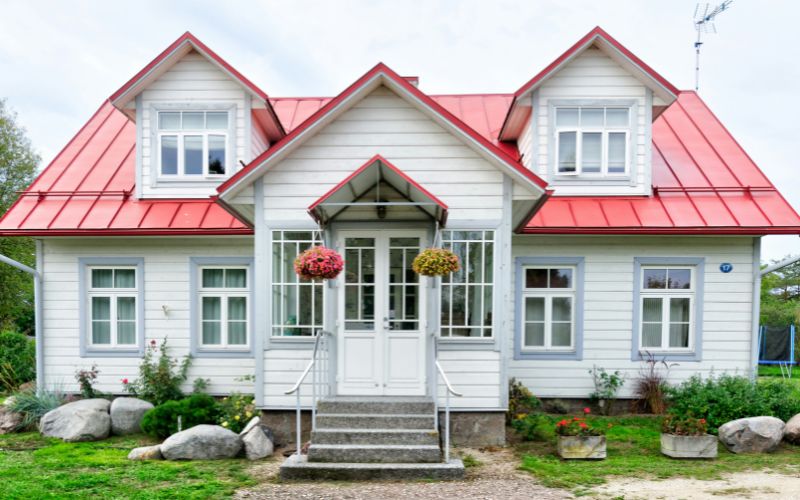
We are reader-supported. When you buy through links on our site, we may earn an affiliate commission.
Cooperative (co-op) housing represents an unconventional path to homeownership. It’s a huge draw for those seeking a more affordable way to own a primary residence, but it’s not all roses. Understand what a housing co-op is, how co-ops differ from other residential housing options, the pros and cons of owning one, and how to finance your purchase.
What Is a Housing Co-Op?
A housing co-op is a corporation consisting of members who own shares in it. The organization owns the real estate, so shareholders become homeowners without owning their units outright. Shareholders are responsible for the organization’s financials, paying regular fees to cover the co-op’s underlying mortgage — or the blanket mortgage — property taxes, insurance, and other expenses. However, they have no personal liability on the debt tied to the property.
The shareholders elect a board of directors to oversee operations. The board makes decisions in the co-op’s best interests, as guided by the organization’s bylaws, such as screening new members and evicting erring shareholders.
Some co-op residents may be nonshareholders. Members may be able to rent their units to outsiders, and a tenant may be able to buy the rights to the unit from its owner by the end of the lease.
In smaller housing co-op communities, the residents handle the maintenance duties themselves. In larger ones, the board may hire a property manager to oversee building maintenance and other day-to-day issues.
Types of Housing Co-Op Models
The structure of a housing co-op can vary from jurisdiction to jurisdiction. The most common types in the United States and Canada are:
- Market rate co-ops, which let you sell your share at whatever price the market pays for it.
- Limited equity co-ops, which allow you to sell your share at a limited profit when its value changes to keep prices affordable and encourage you to stay put.
- Group equity co-ops, which charge a fraction of the cost to get into other co-cops but may restrict you from making money on your share when you leave.
- Leasing co-ops, which lease the building in which their residents live and build no equity in it.
- Senior co-ops, which welcome only adults aged 55 or older and may provide resident care within the community.

Some housing co-op models are more common than others in certain areas. Their popularity depends on the unique needs of their target residents.
How Do Co-Ops Differ From Other Residential Housing Options?
Co-op housing is a homeownership model, not a property type. Apartment complexes, condominiums, single-family homes, duplexes, townhouses, manufactured homes and tiny-house clusters on parcels of land can be co-ops. Ownership sets co-op housing apart from traditional residential housing options.

Co-op neighborhoods have a strong sense of community because similar goals motivate all residents — housing affordability, communal responsibility and socialization.
People living in neighborhoods governed by homeowners’ associations also band together to set policies for the benefit of all residents. However, they are keener on making individual decisions out of self-interest.
For instance, suburban homeowners may oppose new low-cost housing projects to keep population density low and property prices high. Such a sentiment has influenced government policies that helped perpetuate the housing crisis.
Co-Op Housing Pros and Cons
Living in a co-op has advantages and disadvantages. Learn about its pros and cons to determine whether it’s for you.
Co-Op Housing Pros
Here are the joys of being a co-op resident:
- More affordable purchase price: In major cities, co-op shares may come with lower price tags than condo units and incur fewer closing costs.
- Fewer maintenance duties: Living in a co-op apartment minimizes your responsibility to care for the building’s communal amenities. If your community uses a property management company, you can get a qualified technician to repair whatever needs fixing in your unit more quickly.
- More say in your neighbors: Co-op neighborhoods are communities of like-minded people. The whole is more important than the individual. The residents can be selective about the new members they accept to ensure everyone can live together harmoniously.
- Numerous tax advantages: Your share of interest on the blanket loan for the building and your share loan’s interest payments may be tax deductible. You may also be able to deduct some maintenance costs. Seek advice from a qualified tax professional to learn how to lower your tax liability as a co-op resident in your area.
Co-Op Housing Cons
The downsides to co-op housing include the following:
- Larger down payment: A co-op share may cost less than a traditional home but requires special financing. You can’t use a typical mortgage because the funds will go toward purchasing a stock in a corporation instead of owning a tangible piece of real estate. Willing lenders may ask you to pay more than you would when buying an ordinary home to absorb less risk.
- Higher recurring costs: The monthly fees associated with living in a co-op versus a condo mostly apply to the same items. However, as a shareholder, you may deal with loan payments twice — one for the property’s blanket mortgage and the other for your co-op share loan.
- More restrictions: Living in a co-op means giving up some of the freedoms you would typically enjoy by owning a home outright. Your community’s bylaws may restrict specific renovations or subletting.
- Less availability: Co-ops are scarce in many locations. In the U.S., there are more than 65,000 co-op establishments across various industries, including housing. In Canada, co-ops represent only about 0.7% of all dwellings, at about 92,000 units.
How to Finance a Co-Op Share
You need to get the approval of your chosen co-op’s board and a willing lender to finance a share. To get the nod from both parties, you may need at least good credit, a low debt-to-income ratio, a considerable down payment, and a certain amount of cash reserves.

Co-op share loan lenders are few and far between. However, you should be able to find them where co-op housing options are prevalent. Some lenders operate nationally, so they may fund your purchase even though they have no physical presence where you intend to buy.
Is Co-Op Housing for You?
A housing co-op makes homeownership more attainable for some, but it’s not for everyone. Research and explore your options to find what suits your situation best.







